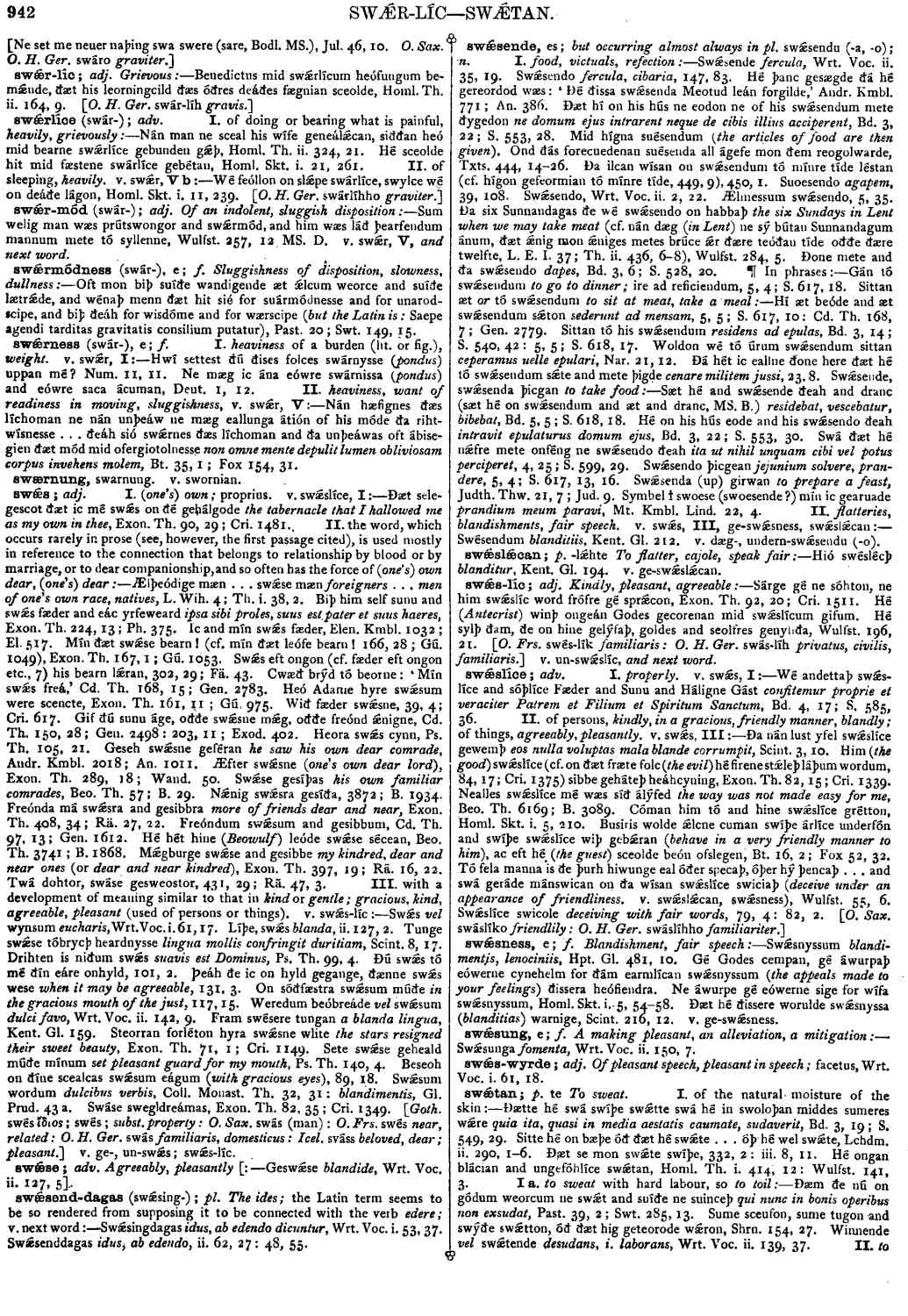swǽs
- adjective
-
Ðæt selegescot ðæt ic mé swǽs on ðé gehálgode
the tabernacle that I hallowed me as my own in thee
,- Exon. Th. 90, 29 ; Cri. 1481. ,
-
Ælþeódige mæn . . . swǽse mæn
foreigners . . . men of one's own race, natives
,- L. Wih. 4; Th. i. 38, 2.
-
Biþ him self sunu and swǽs fæder and eác yrfeweard
ipsa sibi proles, suus est pater et suus haeres
,- Exon. Th. 224, 13; Ph. 375.
-
Ic and mín swǽs fæder,
- Elen. Kmbl. 1032; El. 517.
-
Mín ðæt swǽse bearn! (cf. mín ðæt leófe bearn! 166,
- 28; Gú. 1049), Exon. Th. 167, 1; Gú. 1053.
-
Swǽs eft ongon (cf. fæder eft ongon etc., 7) his bearn lǽran,
- 302, 29; Fä. 43.
-
Cwæð brýd tó beorne : 'Mín swǽs freá,' Cd. Th. 168,
- 15; Gen. 2783.
-
Heó Adame hyre swǽsum were scencte,
- Exon. Th. 161, 11; Gú. 975.
-
Wið fæder swǽsne,
- 39, 4; Cri. 617.
-
Gif ðú sunu áge, oððe swǽsne mǽg, oððe freónd ǽnigne,
- Cd. Th. 150, 28; Gen. 2498 : 203, 11; Exod. 402.
-
Heora swǽs cynn,
- Ps. Th. 105, 21.
-
Geseh swǽsne geféran
he saw his own dear comrade
,- Andr. Kmbl. 2018; An. 1011.
-
Æfter swǽsne (
one's own dear lord
),- Exon. Th. 289, 18; Wand. 50.
-
Swǽse gesíþas
his own familiar comrades
,- Beo. Th. 57; B. 29.
-
Nǽnig swǽsra gesíða,
- 3872; B. 1934.
-
Freónda má swǽsra and gesibbra
more of friends dear and near
,- Exon. Th. 408, 34; Rä. 27, 22.
-
Freóndum swǽsum and gesibbum,
- Cd. Th. 97, 13; Gen. 1612.
-
Hé hét hine (
Beowulf
) leóde swǽse sécean.- Beo. Th. 3741; B. 1868.
-
Mǽgburge swǽse and gesibbe
my kindred, dear and near ones (or dear and near kindred ),
- Exon. Th. 397, 19; Rä. 16, 22.
-
Twá dohtor, swáse gesweostor,
- 431, 29; Rä. 47, 3.
-
Swǽs vel wynsum
eucharis
,- Wrt. Voc. i. 61, 17.
-
Líþe, swǽs
blanda
, ii.- 127, 2.
-
Tunge swǽse tóbrycþ heardnysse
lingua mollis confringit duritiam
,- Scint. 8, 17.
-
Drihten is niðum swǽs
suavis est Dominus
,- Ps. Th. 99, 4.
-
Ðú swǽs tó mé ðín eáre onhyld,
- 101, 2.
-
Þeáh ðe ic on hyld gegange, ðænne swǽs wese
when it may be agreeable
,- 131, 3.
-
On sóðfæstra swǽsum múðe
in the gracious mouth of the just
,- 117, 15.
-
Weredum beóbreáde vel swǽsum
dulci favo
,- Wrt. Voc. ii. 142, 9.
-
Fram swésere tungan
a blanda lingua
,- Kent. Gl. 159.
-
Steorran forléton hyra swǽsne wlite
the stars resigned their sweet beauty
,- Exon. Th. 71, 1; Cri. 1149.
-
Sete swǽse geheald múðe mínum
set pleasant guard for my mouth
,- Ps. Th. 140, 4.
-
Beseoh on ðíne scealcas swǽsum eágum (
with gracious eyes
),- 89, 18.
-
Swǽsum wordum dulcibus verbis, Coll. Monast. Th. 32, 31:
blandimentis
,- Gl. Prud. 43 a. Swáse swegldreámas, Exon. Th. 82, 35; Cri. 1349.
Bosworth, Joseph. “swǽs.” In An Anglo-Saxon Dictionary Online, edited by Thomas Northcote Toller, Christ Sean, and Ondřej Tichy. Prague: Faculty of Arts, Charles University, 2014. https://bosworthtoller.com/29515.
Checked: 0